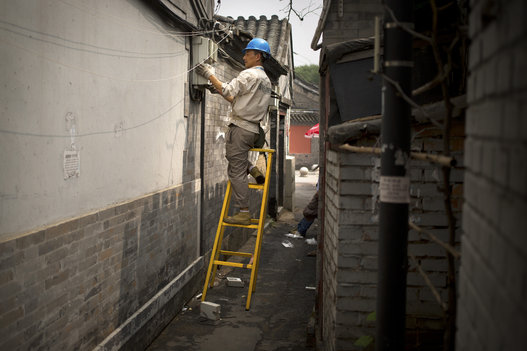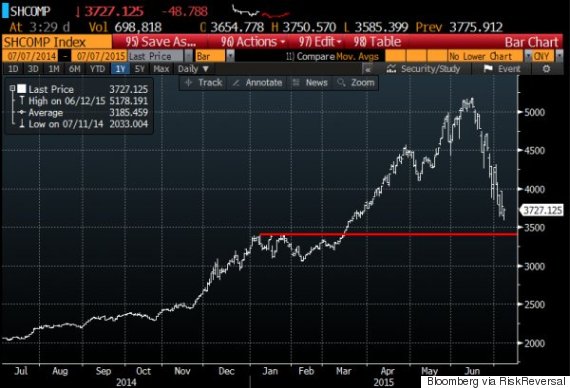 As the Greek debt drama plays itself out one 60-euro withdrawal at a time, some economic observers are saying the world is paying attention to the wrong crisis.
As the Greek debt drama plays itself out one 60-euro withdrawal at a time, some economic observers are saying the world is paying attention to the wrong crisis.
That's because in the space of three weeks, China’s Shanghai Composite stock index has lost nearly 30 per cent of its value, wiping out some $2.3 trillion U.S. in wealth. AsBloomberg News put it, that’s a loss of $1 billion for every minute of trading. Regulators have halted trading in more than 700 listed companies, and at least two dozen IPOs have been cancelled.
And some economists fear the country’s response to the downturn could be worse than the stock market crash itself.
“China could well be setting the stage for another financial time bomb to match its local government debt and real estate bubbles,” said Sherry Cooper, the former chief economist at the Bank of Montreal, in a note issued Tuesday.
She described the Greek crisis as a “sideshow” to the real drama unfolding in China. “China has more than 120 times the population of Greece and is the second largest economy in the world, dominating demand for natural resources,” writes Cooper, who is now chief economist at Dominion Lending Centres.
It’s that demand for natural resources that makes China very important to Canada’s economy, even if the two countries’ trade relationship isn’t that large. By largely determining demand for natural resources, China effectively sets the prices Canada gets for its resources on global markets.
And China’s crash is already having an impact on Canada, Cooper said in an email to HuffPost.
“It has already led to lower commodity prices and therefore further damaged the resource sector of our stock market,” she said. “Today's very weak trade figures reflect the slowdown in energy exports. Not good news for the Canadian economy.”

The Shanghai Composite's recent performance has the hallmark of a classic asset bubble: A rapid, unsustainable rise followed by a sharp correction.
Many observers of China's economy have been alarmed, or at least taken by surprise, by the central government’s aggressive response to the stock price crash. China’s securities regulator is throwing 120 billion yuan ($24.5 billion Cdn) into the stock market through a network of brokerages, in order to shore up stock prices. And in a very unusual move, the Chinese government has actually set a target number for the Shanghai Composite Index: It wants to see it rise to 4,500, from current trading levels below 4,000.
“They are trying to stop the plunge, but this is clearly the wrong way to do it,” Teng Bingsheng, associate dean at Beijing's Cheung Kong Graduate School of Business, told Bloomberg. “The Chinese stock market is already the most manipulated in the world. It’s an overheated market and you can’t stop people from selling.”
Unlike the U.S.’s Troubled Asset Relief Program (TARP) during the 2008-09 crisis, China isn’t trying to rescue companies, it’s trying to rescue stock prices, Anne Stevenson-Yang, founder of J Capital Research, told Quartz.
TARP “focused on the viability of operating companies” and not on the “optics” of a stock market index, Stevenson-Yang said. “There is no way to characterize these measures other than as a ‘double or nothing’ wager.”
Indeed it does seem to be a case of Chinese policymakers doubling down on a strategy, because the country's stock market bubble was the result of policy.
“As the government discouraged consumer investment in real estate [following a housing bubble bust], the Chinese middle class has poured their money into stocks,” Cooper wrote. The result seems to have been a classic asset bubble, with prices rising very sharply in a short period of time, before crashing back down to earth. As theFinancial Post reports, the Shanghai Composite soared 60 per cent since the start of the year, before beginning its swan dive last month.
One of the major problems is that a large share of the money being put into China’s stock market is on margin, meaning investors are borrowing money to play the market. Some 10 per cent of Chinese stocks have been purchased on margin. Andrew Collier, head of Orient Capital Research, says that makes a Chinese stock market rout particularly risky -- because many investors won’t be able to cover their debts.
“If these stocks fall, there will be a lot of protesting unhappy investors. More problems for the leadership. They can support [the stock market] short-term but not long-term,” he said, as quoted at Quartz.
The precarious state of China’s economy is why Cooper says the world should be paying attention to the Asian country rather than Greece, which she says likely faces an exit from the euro if Germany and the ECB continues to call for austerity measures and refuse debt relief.
“This will continue to be a very painful process for Greece, but it might even strengthen the euro and the Eurozone economy. The rest of the world will be largely unaffected,” she wrote.
Original Article
Source: huffingtonpost.ca/
Author: Daniel Tencer
No comments:
Post a Comment